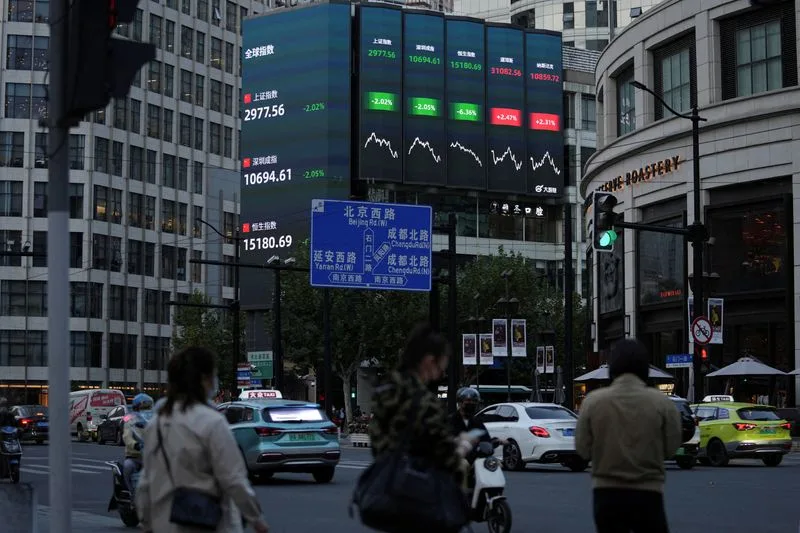SINGAPORE (Reuters) – Chinese markets soared and the yuan rose on Friday, with about a trillion dollars added to the value of Chinese stocks in week, as rumours and news reports fed hopes for twin relief in U.S.-China tension and China’s tough COVID rules.
The Hang Seng surged 5.3% and notched its biggest weekly gain in 11 years. The Shanghai Composite rose 2.4% for a 5.3% weekly gain, the largest in more than two years and China-sensitive assets around the world rose sharply.
Bloomberg News reported initial U.S. inspections of audit papers at U.S.-listed Chinese companies – a long-running point of regulatory tension and risk – finished ahead of time, raising hopes that the U.S. officials were satisfied.
Unsubstantiated social media posts flagging an aim to relax COVID rules in March have also driven optimism all week and seemed to get new momentum on Friday.
A former Chinese senior disease control official told a closed-door conference that substantial changes to the country’s zero-COVID policy were set to take place in the next five to six months, according to a recording of the session heard by Reuters.
“Any indication that some rules could be relaxed would be an immediate dose of grease in the jarring cogs of China’s economy,” said Sophie Lund-Yates, lead equity analyst at Hargreaves Lansdown.
Focus was now on a press conference from China health authorities on Nov. 5.
Gains were broad, overshadowing a downbeat mood in global markets on the prospect of U.S. interest rates rising further than previously expected. Property and tech shares led the way.
Shares in online giants Alibaba and JD.com each rose more than 10% and the Hang Seng Tech index rose 7.5%. Property manager Country Garden Services rose 15% and an index of mainland developers rose 9%.
Hedge fund manager Lei Ming said the re-opening rumour is just the trigger for a rebound in an oversold market.
“The main reason for the market jump is that selling pressure had been exhausted after the market fell so much.”
Gains in value, across Hong Kong, Shenzhen and Shanghai over the week are approximately $1 trillion. However the Hang Seng remains down 30% this year against a 24% fall in world stocks. The Shanghai Composite is down 15% this year.
The rally extended to commodities markets with iron ore futures surging on Friday, and China-sensitive stocks listed in London and Europe.
Miners such as Rio Tinto and Anglo American rose sharply along with luxury retails like LVMH and Swiss jeweller Richemont.
U.S.-listed China stocks surged in early trading, with Nasdaq Golden Dragon China index on track for its best week in eight months following its worst monthly performance on record in October.
Strategists at TD Securities continue to expect a gradual easing of zero-COVID restrictions, warning that markets could be in for some disappointment if investors are expecting something more rapid.
BUY THE RUMOUR
Changes to COVID policies have not been officially flagged. A foreign ministry spokesman said on Tuesday he was not aware of the situation, when asked about rumours on social media that China was planning a reopening from strict COVID curbs in March.
Bloomberg News also reported on Friday, citing unnamed people familiar with the matter, that China was working towards relaxing rules that penalise airlines for carrying COVID-positive passengers.
A foreign ministry spokesman later said he was not aware of the report and that China’s COVID policies were consistent and clear.
An early conclusion to audit checks has also not been confirmed by either Chinese or U.S. officials. Yet markets have desperate reasons to rally after the Hang Seng hit a 13-year low last month in the wake of China’s Communist Party Congress.
“I do not see anything new that has changed the Hong Kong and China investment environment,” said Frank Benzimra, head of Asia equity strategy at Societe Generale in Hong Kong.
“The only explanation I have is that the sell-off has been excessive post-Congress, valuation on some offshore names has been very distressed, and there is some bottom-fishing.”
The currency joined in the rally, touching a one-week high of 7.2340 per dollar.[CNY/]

